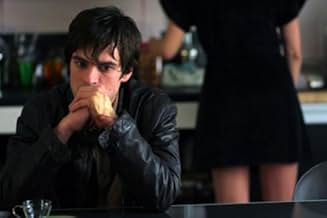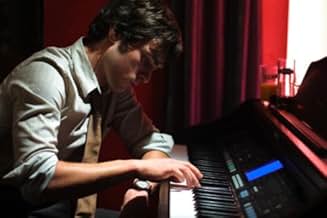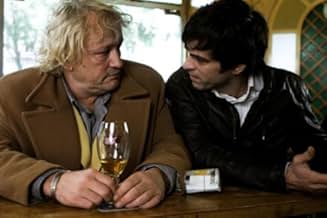De latir mi corazón se ha parado
¿Seguirá Thomas llevando una vida de crimen y crueldad, igual que su matón padre, o perseguirá su sueño de convertirse en pianista?¿Seguirá Thomas llevando una vida de crimen y crueldad, igual que su matón padre, o perseguirá su sueño de convertirse en pianista?¿Seguirá Thomas llevando una vida de crimen y crueldad, igual que su matón padre, o perseguirá su sueño de convertirse en pianista?
- Dirección
- Guión
- Reparto principal
- Ganó 1 premio BAFTA
- 22 premios y 14 nominaciones en total
Reseñas destacadas
Basic plot line involves a young man, 'Tom', who is very much caught up in 'the life' of being a thug like his father. He pals around with his two partners and they work hard by day and party harder at night (usually ending with a barfight). Then one day he spots his deceased mother's old music agent who offers him an audition in gratitude (Tom's mother was a professional concert pianist).
What follows is an intriguing and humorous plot line as Tom takes on a piano coach (from Beijing no less) and tries to regain his affinity with the piano almost ten years after he'd stopped playing.
Extremely well-acted film with Romain Duris (as 'Tom') offering up one of those rare performances that's absolutely mesmerizing (most USA audiences will remember him from "L'Auberge espagnole" - another French film worth your time!).
Based on a flop more admired in France than the US, James Toback's 70's Harvey Keitel vehicle about a violent would-be pianist, "Fingers," this compulsively watchable, thrillingly accomplished new movie by Jacques Audiard ("De Battre mon cur s'est arrêté", still showing in Paris as it opens here) echoes his previous compellingly offbeat "Read My Lips" in grafting together two separate moral universes. Read My Lips depicted the odd alliance of a firecracker ex-con (Vincent Cassel) and a mild-mannered but angry hearing-impaired office worker (Emmanuelle Devos). It was an intriguing piece -- but seems low energy in retrospect compared to this. Audiard has made a powerful actors' movie in which Duris blooms, a powerful actor now, playing in effect both the Cassel and the Devos parts and acting out the resulting implosion of violence and frustrated artistic passion with astonishing zest. It's hard to believe he was the tame college student narrator of Klapich's "L'Auberge espagnole" three years ago.
Duris as Tom is good-looking but vaguely burnt-out, his eyes a bit crazy, his hair neatly coifed, his jaw firm, has mouth a smiling snarl. The camera is on that square jaw every minute. Uniformed in boots, smart pants, tie and trim leather jacket, he's an elegant young hoodlum who can switch to a dark suit for a real estate hearing or audition, or wipe the blood off his cuff to enter a café or concert hall. He's angry all the time but brings vibrant energy to both of his conflicting lives. Tom finds a beautiful long-haired young master pianist called Miao Lin (Linh Dan Pham) to coach him in piano. These encounters with the keyboard he approaches like a prize fighter going at a punching bag. If he's an artist it's the hairy-chested, coiled, macho kind. How can you teach anybody pianistic excellence? The impossibility of the process is signaled by the teacher's speaking no French. She harangues Tom in Vietnamese, or just says in English over and over, "again" Or "no." Or "no smoking allowed." A cup of tea in the kitchen at end of session. Tom goes at the same piece over and over, a Bach Toccata. This relationship is an "oasis of calm" in Tom's otherwise 'loca' 'vida' -- the contrasts in such a piece as this are telegraphed without much subtlety -- but the unconventionality of the pair helps the scenes to avoid cliché. And the intensity is just as focused in these quiet moments.
There are other strong relationships. Tom isn't isolated; he works with partners, one of whom uses him to hide his two-timing from his wife. Arestrup, who looks like a French version of late Brando, is superb as the blowsy, burnt out father, a big sensualist, an irresistible presence, always smoking drinking and eating, soft but nasty, irritating but impossible for Tom not to love and protect. Tom pursues Minskov (Anton Yakovlev), a Russian Mafioso his dad has tangled with, and winds up sleeping with Minskov's French girlfriend as well as somebody else's wife. Every encounter he has is reckless and intense. Duris doesn't fail us in any of this. Emmanuelle Devos is his dad's new girlfriend, whom Tom first calls a whore and rejects and then wants to hire on to calm things on the home front. Where's it all going to end? Despite all that's going on, as one French critic said, "there's no fat" in this picture. The pushes and pulls of the hero's dilemma make for fabulously kinetic editing and the action never goes soft. A final sequel resolves things. Some say it's milder than the American version, but that's overlooking the visceral punch of the action throughout. The dialogue underlines that just as in Read My Lips, people aren't communicating too well. It may be music is all that links them.
The shortcomings of such a movie are its simplifications. The crooked real estate life like the classical pianist life can be no more than impressionistically dabbed in. And there's an occasional danger that Romain Duris -- who studied piano for months with his pianist sister for the keyboard sequences -- may be trying too hard sometimes. Since Tom also loves electro which he listens to with big headphones in his car -- as the word is Duris himself does -- classical music maybe doesn't grab the film as wholeheartedly as it ought to. You can't expect profundity but from the sound of "Fingers," this is more accomplished film-making. It may not have as much conviction, but this is wildly entertaining. And more than that, it's a movie where everything comes together, scenario, actors, editing. Audiard, who showed us dark secret places last time, now reveals himself a virtuoso of violence and passion.
Jacques Audiard, not the most famous but certainly one of the most talented french directors of the last ten years, has remarkably transcribed the mythology and some of the most eminent film-noir themes onto the modern era. The framing, lighting, music (especially its juxtaposition), mood and plot development are spot-on while the main performance my Romain Duris is career defining. The film stands out as one of the best modern neo-noir -a film with a rather singular style, akin to the director's equally commendable previous works.
The plot is not so much of a linear story, but more of a cross-sectional cuts of various aspects of Thomas' life. On the more mundane side are his business activities that alway verge on being criminal, his affair with his partner's neglected wife and his relationship with his father to whom he seems quite devoted.
More interesting is his musical pursuits, triggered by a chance encounter with his late mother's manager who remembers his talent and invites him to an audition "when he is ready". This leads to his seeking help from an accomplished pianist Miao Lin, a young women who studied in the Beijing Conservatory, just arrived in Paris, speaking no French at all and "just a little" English. (Here we see the not unusual sloppiness when an Asian aspect is covered in a "western" movie. There is absolutely no logical reason for a woman from China to be speaking Vietnamese, except for one - the actress IS Vietnamese). Anyway, the communication purely through music and gesture is very well handled.
The shooting style is quite contemporary, and leans towards using darker scenes. Interesting to note that in the two series of piano practicing scenes, it's always dark and gloomy when he plays at home, but is reasonably bright when he is at coach Miao Lin's place.
As with such non-story-oriented movies, the ending is inconclusive. But that does not matter as it is the character study that is of prime interest.
¿Sabías que...?
- CuriosidadesRomain Duris's sister is a pianist, and she is the one who taught him to play piano for this film.
- Citas
Sami: Playing piano is making you flip. Stop it now!
Thomas Seyr: Nothing's making me flip. I'm not flipping. I'm having a ball. I feel fantastic, dont' you see? It's important, I'm serious about it.
Sami: You gonna make dough from pianos?
Thomas Seyr: Not pianos, the piano! It's not about making money, it's about art.
Sami: What's in it for us? You coming to meetings all, 'Hi guys, I've been playing piano.' Shit, I'll take up the banjo.
Thomas Seyr: It's over your head
- ConexionesRemake of Melodía para un asesinato (1978)
Selecciones populares
Detalles
- Fecha de lanzamiento
- País de origen
- Sitios oficiales
- Idiomas
- Títulos en diferentes países
- De tant bategar se m'ha parat el cor
- Localizaciones del rodaje
- Empresas productoras
- Ver más compañías en los créditos en IMDbPro
Taquilla
- Presupuesto
- 5.300.000 € (estimación)
- Recaudación en Estados Unidos y Canadá
- 1.023.424 US$
- Fin de semana de estreno en EE. UU. y Canadá
- 65.365 US$
- 3 jul 2005
- Recaudación en todo el mundo
- 11.757.109 US$
- Duración1 hora 48 minutos
- Color
- Mezcla de sonido
- Relación de aspecto
- 1.85 : 1






























